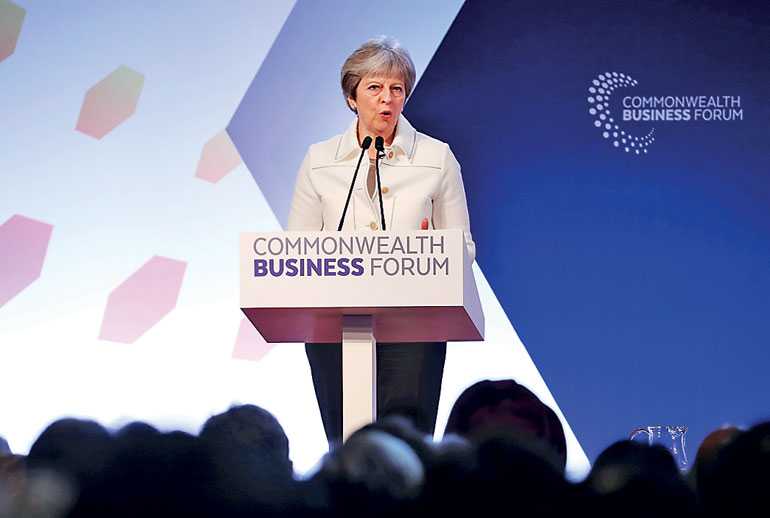Tuesday Feb 24, 2026
Tuesday Feb 24, 2026
Wednesday, 18 April 2018 00:03 - - {{hitsCtrl.values.hits}}

Britain’s Prime Minister Theresa May speaks at a Commonwealth Heads of Government Meeting business forum in London, April 16, 2018. REUTERS
British Prime Minister Theresa May speaking at the Commonwealth Business Forum opening in London on Monday, said “global growth is fragile”.However she added that more could be done to make the global system fairer.
Defending free trade she said: “While we should be unapologetic in our support for free and inclusive trade, we should also work hand-in-hand with businesses to make it more efficient and effective for example by supporting the use of international standards.”
“Shared standards have huge potential to stimulate trade.They create a common language for trading partners across the globe, enhance trust in supply chains and stimulate innovation.Greater use of these international standards across the Commonwealth will reduce the costs of trade between members, as well as with partners beyond the Commonwealth, for greater global benefit,” she added.
“That is why the UK will be funding an all-new Commonwealth Standards Network, which will support developing  countries in particular to better meet existing international standards.The network will provide a significant opportunity for national standards experts to collaborate and share best practice,” she explained.
countries in particular to better meet existing international standards.The network will provide a significant opportunity for national standards experts to collaborate and share best practice,” she explained.
“And it will empower developing countries to have a stronger voice in the international standards community – something that has benefits on a global scale.”
The British Prime Minister emphasised that the best way to raise living standards for all is through economic growth based on free enterprise operating in inclusive, fair and open rules-based markets.
“A key part of that, one that has become more important in the years since the Commonwealth was founded, is international trade – and it is an area in which the Commonwealth is flourishing,” she noted.
“The 2018 Commonwealth Trade Review predicted that trade between member states will be worth $700 billion by 2020. Here in the UK, for example, the value of our exports to fellow members is roughly double what it was 20 years ago,” she revealed.
“Yet risks remain,” she acknowledged. “The challenges posed by protectionism are all too clear. And the world economy is changing, as new technology creates new jobs in some industries while supplanting them in others.”
May confidently asserted that if the Commonwealth businesses were to flourish in such times, if a secure the prosperous futurewas to be delivered the way the young people want and deserve, then the Commonwealth and national governments must not be afraid to act.
“Because although the system of international commerce has done much good for the world, it can always be improved. Playing fields can be levelled, barriers removed, the benefits opened up to all,” she stressed.
The Commonwealth is a 53-nation bloc consisting of the UK and its former colonies, including Sri Lanka, India, Canada, Singapore and Nigeria. It encompasses 2.4 billion people and in 2017 had a combined gross domestic product (GDP) of $10.4 trillion.
Increasing trade with the Commonwealth has been suggested by some as an important option for the future of the UK after Brexit.
Currently, the Commonwealth accounts for a small part of UK trade. Roughly 9% of total UK exports went to the Commonwealth in 2016, dwarfed by the 43% that went to the EU. Meanwhile, the Commonwealth provided around 8% of the U.K.›s imports, roughly the same as those coming into the UK from China.Intra-Commonwealth trade in goods and services rose to $560 billion in 2016, although this only accounted for 20% of the member countries› total global trade. The figure is expected to reach $700 billion by 2020.
Speaking of future plans she revealed that Britain would also be funding a Trade Facilitation Programme, supporting and providing technical assistance to selected Commonwealth countries in implementing the World Trade Organization’s Trade Facilitation Agreement. Full implementation of the WTO agreement is estimated to reduce trade costs by up to 16% for less-developed countries.
The Commonwealth is a 53-nation bloc consisting of the UK and its former colonies, including Sri Lanka, India, Canada, Singapore and Nigeria. It encompasses 2.4 billion people and in 2017 had a combined gross domestic product (GDP) of $10.4 trillion.Increasing trade with the Commonwealth has been suggested by some as an important option for the future of the UK after Brexit.
“It will cut the average time needed to import goods by 47%, and the time taken to export by as much as 91%, a huge boost for businesses across the Commonwealth.But no amount of action on these fronts will truly be successful if half the Commonwealth’s citizens continue to face significant barriers to participation in the economy.”
She called on all delegates to share ideas and insights, to identify new challenges and new opportunities, to highlight where Commonwealth governments can step up and do more and even where, perhaps, we should step back and do a little less.
Playing fields can be levelled, barriers removed,and the benefits opened up to all - British Prime Minister Theresa May
“The Commonwealth has never just been about heads of state and government. It has always been an organisation in which people and businesses from around the world can come together and work together to improve all our lives. This is your Forum, and this is your Commonwealth. So let us make it an organization that works for all of us, and shape a future of which we can all be proud,” she concluded.